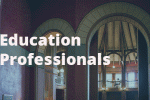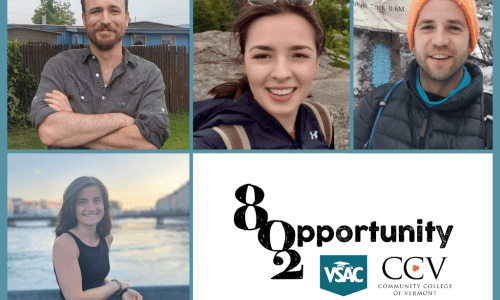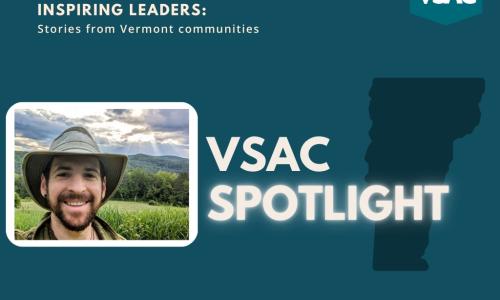Planning for college or training this year? Apply for the Vermont Grant.
VSAC’s Amy Dodge uses her personal story to encourage first-generation students
 First-generation college students — or students whose parents did not go to college — are much less likely to pursue and to complete postsecondary degrees than are their classmates whose parents did go to college. According to data gathered by the Vermont Student Assistance Corporation (VSAC), first-generation students are 11% less likely to go on to college than are the sons and daughters of college-educated parents.
First-generation college students — or students whose parents did not go to college — are much less likely to pursue and to complete postsecondary degrees than are their classmates whose parents did go to college. According to data gathered by the Vermont Student Assistance Corporation (VSAC), first-generation students are 11% less likely to go on to college than are the sons and daughters of college-educated parents.
As part of VSAC’s missions is to close this gap, the organization works with more than 6,000 Vermont high school students each year who are first-generation and/or low-income.
Amy Dodge is VSAC’s lead counselor for the GEAR UP Program, a federally funded college and career counseling program that stands for Gaining Early Awareness and Readiness for Undergraduate Programs. GEAR UP serves students who come from modest income backgrounds or who will be the first in their families to attend college. The goal is to make them aware of their postsecondary education options, improve their academic performance in high school, and increase their rates of completing a college education.
Dodge mentors and supervises the 11 GEAR UP counselors who work with first-generation students. She says the biggest challenges these students face usually have to do with managing family relationships, along with the procedural hurdles of applying to college.
“It’s not an easy path. It’s not just, ‘I don’t know how to fill out the FAFSA’,” Dodge says, referring to the federal application for financial aid programs. “We can sort all that out. It’s the other stuff that requires a lot of navigating.”
And she has lived that experience firsthand as a first-generation student who put herself through school in her late thirties, earning her associate, bachelor’s, and master’s degrees.
“I grew up very, very poor,” Dodge recalls. “And once I started pursuing my education, my mom and my sisters couldn’t relate to me anymore. They thought I was all ‘high-falutin’,” she laughs. “It’s definitely hard for first-gen families to relate to someone moving out of that station,” she explains, adding that she’s spoken with many students who’ve said they’ve felt the need to sneak out of the house to go to class. And it can be really hurtful for those students to feel that their family isn’t rooting for them.
“Not one person came to my first graduation from CCV when I got my associate degree,” Dodge recalls. “I cried and cried.”
But today, she says, “I don’t feel sorry for myself; I use that experience to be able to advise the students I work with. My story is 100% relatable.”
Dodge encourages her first-gen students who don’t have support at home to seek out people outside their family bubbles, such as teachers and guidance counselors. “You have all these other people in your life who can help you celebrate,” she says. “And you can’t have hard feelings about your family because they just may not get it. It could take a while, and it might never happen. But you have to do this for yourself.”
That’s a mantra that Amy Dodge knows well. After struggling through high school at Thetford Academy, she was labeled learning-disabled, but never diagnosed or helped with the dyslexia she now knows she has. She was put into the vocational track, and at age 20 she was working as a bartender, a very young single mom to a one-year-old son.
One of her regular customers at the local watering hole was a director for the Orange-Windsor School Supervisory Union. After his administrative assistant left, he recruited Amy to come work for him.
“I thought, I don’t want to be a bartender anymore,” Dodge recalls. “So I went in for the interview — dressed all up — and got the job. I knew nothing. I had never even touched a computer before! Fake it till you make it, right?”
But once Dodge started working in the education field, she realized that she wasn’t the “girl who couldn’t read or write” — something she’d been labeled her whole life. During her time at the supervisory union, and after she moved on to become the school secretary for the K–12 school in South Royalton, she discovered she was a whiz with computers. She also wrote the school’s newsletter and designed the website.
Dodge’s school principal at South Royalton School kept reminding her that they had tuition reimbursement and encouraged her to take a class. “I had already taken all the computer courses at the professional learning center. So, he said, ‘Well, how about a college class?’ I said, are you kidding me?”
After several rounds of cajoling, she finally agreed to take a digital photography class, “so I could take all the pictures for the sports teams,” she laughs. “I walked into CCV in Montpelier to enroll, and I was scared to death. I was 37 years old with kids in high school and middle school. But I was petrified. The old CCV building had these gigantic doors, and when you creaked them open, you just felt so small.”
She went inside, unsure where to go, and ended up asking a man in the hallway for directions. He showed her upstairs and started asking her some questions, and Dodge shared her story. That man turned out to be the professor for Assessment of Prior Learning, the frequent “first course” for adult students pursuing their degrees. “He made me take the Accuplacer placement test, and when I got all done, he already had me signed up in his class.”
After that semester, Dodge worked with VSAC’s Educational Opportunity Center and started taking two classes each semester. The EOC, a VSAC program that works exclusively with adult students, was instrumental in her success, Dodge says. “I’m really not sure how I would have done this without them.” She got her associate degree from CCV in administrative management, then went on to Johnson State College, where she earned her bachelor’s degree in professional studies/education administration.
The Monday after her daughter graduated from high school, Dodge left her job in the school’s administrative office and went to work at CCV. “It was a $10,000 pay cut, but they offered tuition reimbursement,” Dodge says, her eyes brightening. She stresses how supportive all her employers were of her educational journey, starting with the South Royalton School principal, to Joyce Judy, President of CCV, and, of course, VSAC. “I owe them all so much,” Dodge says.
Through the tuition reimbursement at CCV, Dodge’s daughter got free tuition at VTSU Castleton, and Dodge got her own master’s degree from Lyndon in educational technology. “My daughter and I both ended up graduating with zero debt,” she says.
It took her seven years total from the time she took that first placement test at CCV until she got her master’s. “I never stopped. I figured if I took a semester off, I wouldn’t finish,” Dodge says. She also proudly notes the fact that, “for the girl who supposedly couldn’t read or write,” she earned a 4.0 GPA all the way through.
In addition to supervising the team of 11 GEAR UP counselors at VSAC, Dodge also teaches two courses at CCV — one being Assessment of Prior Learning (the first college-level class she ever took) and the other, Introduction to College Studies for high school students. “These are my people, you know?” Dodge laughs.
“At VSAC, I’m more on the administrative side now, and sometimes I miss not working one-on-one with students. But I feel like I’m making a bigger impact because I’m helping 11 people help 2,500 students, where before I was just helping 250 students on my own,” she says.
And these days, she finds she can barely go anywhere without hearing from her former students. “I turn on Facebook, there’s someone with a question. I go to the grocery store, there’s someone with a question. South Royalton students, CCV students. Students who’ve taken a course or two and want to know how to get their bachelor’s,” Dodge says. She’s always eager to make connections for them, often involving her colleagues at VSAC.
“You become their best friend. And the story I just told you about my own experience — you get the same story from every one of them,” she says. “‘I’m doing this! I’m doing that! I couldn’t have done it without you!’ It just makes my day.”
Need help with pursuing your career goals and education? VSAC is here to help you. For information on college and career planning and help with financial aid, go to www.vsac.org/FAFSAfirst and check out our online workshops and events. You can also give us a call at 800-642-3177, 8:00 am to 4:30 pm, Monday through Friday, or e-mail us at info@vsac.org.






